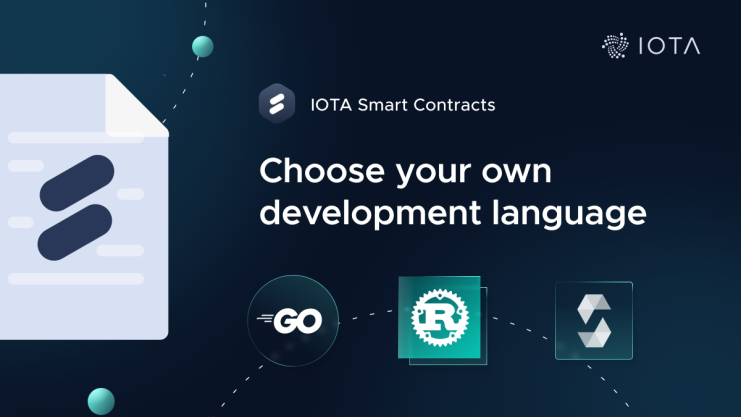IOTA unveils smart contracts

The IOTA Foundation today announced the beta release of IOTA Smart Contracts.
The fully-functional smart contract solution offers a number of new features aimed at resolving current scalability and transaction fee issues, while offering new features currently unmatched in the crypto space.
The IOTA Smart Contracts Beta enables users to create and execute custom smart contracts on a feeless network for the first time. It also comes with Ethereum Virtual Machine (EVM) support, the current industry standard. Developers can now write Solidity smart contracts inside an EVM chain that is anchored on the feeless IOTA Tangle.
To encourage more users to test IOTA Smart Contracts, the feature supports several programming languages, including Go, Rust, and Ethereum’s Solidity. This choice is in line with the IOTA Foundation’s commitment to interoperability and standardisation – two cornerstone principles of the new digital economy.
Unlike Ethereum, however, IOTA Smart Contracts enables developers to set their own execution fees. This dynamic pricing creates an incentive to drive fees down, since different chains can compete for the work of executing a smart contract. Thanks to IOTA’s support of feeless transactions, zero-fee smart contracts become tangible with the Beta release.
The most powerful and unique feature of IOTA Smart Contracts is its scalability and interoperability. The network already offers full sharding, making it possible to scale smart contracts beyond the current limitations on other networks.
By leveraging native tokenisation on the IOTA Ledger, all smart contracts are able to wrap assets onto the base layer. This makes all smart contracts and any digital asset created on IOTA fully interoperable without the need for trusted relays or bridges. This will enable powerful new composability for dApp developers and new possibilities for users to engage in the ecosystem.
Another feature of the IOTA Smart Contracts Beta is the Smart Contracts Schema tool, which helps automatically generate many of the standard-form sections of a smart contract. Like regular paper-based contracts, smart contracts consist of a fair amount of boilerplate, which takes considerable effort to generate manually.
Automatically generated client codebase libraries
With the IOTA Smart Contracts Schema tool, users can input the functionalities they wish to include into the smart contract they are writing and have the system automatically generate and test the appropriate boilerplate code. The Schema tool currently works on Go and Rust smart contracts, and future IOTA Smart Contracts releases will expand its functionalities and add further convenience, such as automatically generated client codebase libraries.
The features of the IOTA Smart Contracts Beta include:
- Fully programmable smart contracts – users can develop and test complete smart contract solutions
- Interoperability between smart contracts – completely trustless and powered by feeless native asset transfers.
- Low-to-zero fees – the Tangle enables users to set their own smart contract execution fees or go completely feeless
- A choice of programming languages – users can pick between Go, Rust and Solidity
- Ethereum Virtual Machine compatibility – interoperability in line with the current industry standard
- Automatically generated and verified boilerplate code – the IOTA Smart Contract Schema tool reduces time and error rate when creating the standardized portions of a smart contract
“When we released the IOTA Smart Contract Protocol Alpha in March of 2021, we sketched our vision of where the future of Smart contract innovation was headed, and how we would eventually enable those innovations on IOTA.” said Dominik Schiener, co-founder and chairman of the IOTA Foundation.
“The IOTA Smart Contract Beta is the realisation of this vision. We have integrated some of the defining features of IOTA – interoperability, flexibility, feeless transactions – into a smart contract solution for a new generation that we believe will become industry standard once it is released on the IOTA mainnet.
“We invite as many users as possible to try out the current Smart Contracts Beta and to see for themselves how much potential this release has.”
The IOTA Smart Contracts Beta can be tested on the IOTA 2.0 DevNet. The IOTA Foundation is now working to bring its smart contract solution to the IOTA mainnet, so that users can enjoy the entirety of Smart Contract functionalities even prior to the IOTA 2.0 release. The next version of IOTA Smart Contracts will include expanded EVM integration and a permissionless market for chain validators.